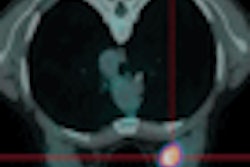
NEW YORK (Reuters Health), Nov 21 - Breast cancer patients with brain metastases benefit from treatment with intravenous chemotherapy in combination with radiotherapy, according to a report in the November 1 issue of Cancer.
Whole-brain radiotherapy (WBRT) is a cornerstone of treatment for patients with brain metastases, the authors explain, but the role of systemic chemotherapy for these patients remains unclear.
In a phase II trial, Dr. Philippe Cassier from Edouard Herriot Hospital in Lyon, France, and colleagues assessed the safety, tolerability, and efficacy of concurrent therapy with cisplatin, vinorelbine, and WBRT in 25 women with previously untreated brain metastases from breast cancer.
Three patients (12%) had complete disappearance of brain metastases, 16 (64%) had partial responses, and two had stable disease for several months, the authors report.
Median time to progression of brain disease was 5.2 months from study entry, with a median duration of response of 8.5 months.
Systemic responses (cerebral and extracerebral disease) were complete in one patient and partial in 10, for an overall response rate of 44%, the authors said. Five patients had stable disease for a median 4.2 months.
Median systemic progression-free survival was 3.7 months from study entry, the researchers note, with four patients remaining progression-free at 12 months.
The median overall survival was 6.5 months, the investigators say, with seven patients (28%) alive at 12 months after study entry.
Side effects from WBRT were generally mild, the report indicates, but most patients experienced grade 3-4 hematologic toxicities likely related to the chemotherapy. Eleven women (44%) discontinued treatment because of disease progression or toxicity.
The authors conclude that "chemotherapy with cisplatin and vinorelbine combined with concurrent WBRT is feasible and induces a high response rate in brain metastases from breast cancer while providing an interesting response rate of systemic disease, and has an acceptable toxicity profile."
"However," they add, "despite this high rate of cerebral control, benefit in overall survival appears to be marginal compared with radiotherapy alone. This combination could therefore have interest for patients with both cerebral and extracerebral progression."
Cancer 2008;113:2532-2538.
Last Updated: 2008-11-20 13:36:16 -0400 (Reuters Health)
Related Reading
Extra radiation dose helps local control of breast cancer, August 15, 2007
Copyright © 2008 Reuters Limited. All rights reserved. Republication or redistribution of Reuters content, including by framing or similar means, is expressly prohibited without the prior written consent of Reuters. Reuters shall not be liable for any errors or delays in the content, or for any actions taken in reliance thereon. Reuters and the Reuters sphere logo are registered trademarks and trademarks of the Reuters group of companies around the world.

















